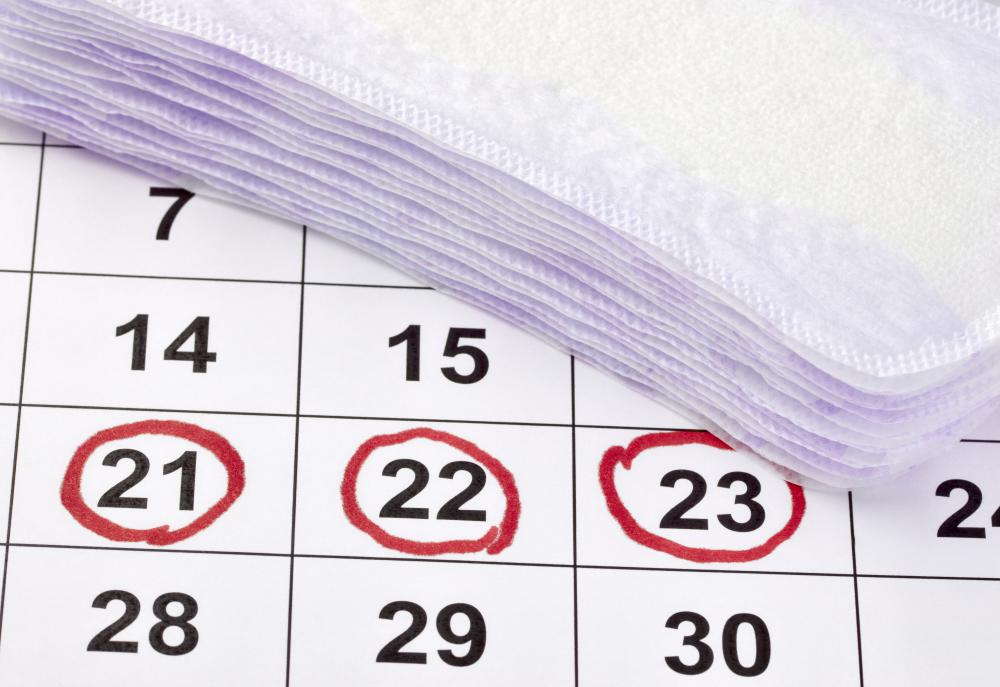At WiseGEEK, we're committed to delivering accurate, trustworthy information. Our expert-authored content is rigorously fact-checked and sourced from credible authorities. Discover how we uphold the highest standards in providing you with reliable knowledge.
What is Considered a Normal Menstruation Flow?
Many women are concerned about possibly having an abnormal menstruation flow because, typically, women do not discuss the details of menstruation with each other, do not receive education about it, and simply do not know what is or is not considered normal. Additionally, a woman might experience atypical menstruation her whole life and never be concerned about it because, for her, it is normal since she has never had anything else with which to compare it. The National Institute of Health (NIH), as well as several other organizations and doctors, provides some information for women about what a normal menstruation flow should be like. This includes the period length, frequency of menstruation, and amount of bleeding that typically occurs.
Bleeding anywhere between four to seven days is typical, however, numbers outside of this range may still be considered a normal menstruation flow. Young women who have begun menstruating within the past couple of years may experience some irregularity with period length, such as bleeding very lightly for a day or two instead of having a full period. This problem tends to resolve itself with age, however, it is important to let a gynecologist know what is going on because this can also be a sign of other conditions.

The average menstrual cycle length, or the timing between periods, falls somewhere around a month for most women. Some women have very regular periods every 24 or 25 days, while others get it every 33 or 34 days, and others may have a variable length between menstrual periods. Again, variation in timing for young women who have just begun menstruating is not uncommon. Women experiencing abnormal timing of menstrual periods should talk to a gynecologist to make sure there is no underlying health problem. A doctor also may be able to solve this problem by prescribing birth control, which contains hormones that regulate the period and promote a normal menstruation flow.

One of the most common features of a period that gets mistaken for abnormal is the amount of bleeding that occurs. Partly this is because seeing a large amount of blood can be a frightening experience and tends to cause worry about whether something may be wrong. While it is important to consult a doctor if a problem is suspected, the range for what is considered a normal menstruation flow is fairly large. Studies have shown that, during a normal period, most women shed between 2 to 7 teaspoons (10 to 35 ml) of blood. Since this is difficult to estimate, most guidelines recommend that as long as you are not having to use more than one pad or tampon every hour for several hours, the flow is probably normal.
AS FEATURED ON:
AS FEATURED ON:














Discussion Comments
Most women have cycles that last either 28 days or 31 days. Of course, there are women who experience it differently like me. My cycles last 35 days and sometimes even longer. They are always like this though.
I did experience some changes when I had hypothyroidism and was taking thyroid medications. But aside from that time, my cycles have always been long. My period, on the other hand, only lasts 4 days.
@turquoise-- You should discuss this with your doctor for the most accurate advice. But if you're not changing pads every hour, I'm sure the flow is normal.
It's difficult for women to know what's abnormal like the article said because each women is different. Our cycles and flow and other symptoms all vary a little bit. So even if we do ask our friends, mothers or sisters, we're likely to get different answers. That's why it's best to speak to a gynecologist about it.
Do women really shed 2 to 7 teaspoons of blood during the entire period? It seems like it should be a lot more.
I only use about three to four pads the entire day during the heaviest flow days (first two days for me). So I don't think I have abnormal menstruation flow. But it seems like I definitely shed more than 7 teaspoons.
Post your comments